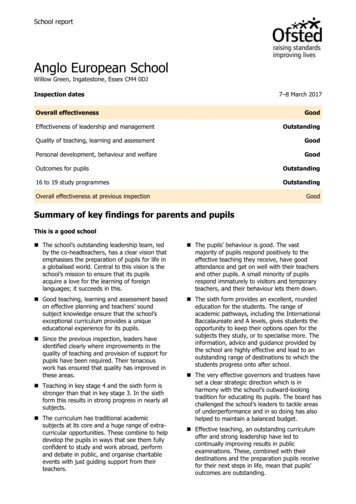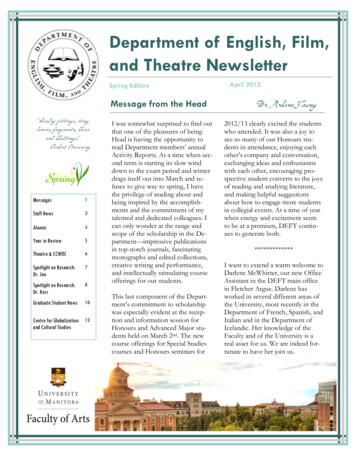
Transcription
School reportAnglo European SchoolWillow Green, Ingatestone, Essex CM4 0DJInspection dates7–8 March 2017Overall effectivenessGoodEffectiveness of leadership and managementOutstandingQuality of teaching, learning and assessmentGoodPersonal development, behaviour and welfareGoodOutcomes for pupilsOutstanding16 to 19 study programmesOutstandingOverall effectiveness at previous inspectionGoodSummary of key findings for parents and pupilsThis is a good school The school’s outstanding leadership team, ledby the co-headteachers, has a clear vision thatemphasises the preparation of pupils for life ina globalised world. Central to this vision is theschool’s mission to ensure that its pupilsacquire a love for the learning of foreignlanguages; it succeeds in this. The pupils’ behaviour is good. The vastmajority of pupils respond positively to theeffective teaching they receive, have goodattendance and get on well with their teachersand other pupils. A small minority of pupilsrespond immaturely to visitors and temporaryteachers, and their behaviour lets them down. Good teaching, learning and assessment basedon effective planning and teachers’ soundsubject knowledge ensure that the school’sexceptional curriculum provides a uniqueeducational experience for its pupils. The sixth form provides an excellent, roundededucation for the students. The range ofacademic pathways, including the InternationalBaccalaureate and A levels, gives students theopportunity to keep their options open for thesubjects they study, or to specialise more. Theinformation, advice and guidance provided bythe school are highly effective and lead to anoutstanding range of destinations to which thestudents progress onto after school. Since the previous inspection, leaders haveidentified clearly where improvements in thequality of teaching and provision of support forpupils have been required. Their tenaciouswork has ensured that quality has improved inthese areas. Teaching in key stage 4 and the sixth form isstronger than that in key stage 3. In the sixthform this results in strong progress in nearly allsubjects. The curriculum has traditional academicsubjects at its core and a huge range of extracurricular opportunities. These combine to helpdevelop the pupils in ways that see them fullyconfident to study and work abroad, performand debate in public, and organise charitableevents with just guiding support from theirteachers. The very effective governors and trustees haveset a clear strategic direction which is inharmony with the school’s outward-lookingtradition for educating its pupils. The board haschallenged the school’s leaders to tackle areasof underperformance and in so doing has alsohelped to maintain a balanced budget. Effective teaching, an outstanding curriculumoffer and strong leadership have led tocontinually improving results in publicexaminations. These, combined with theirdestinations and the preparation pupils receivefor their next steps in life, mean that pupils’outcomes are outstanding.
Full reportWhat does the school need to do to improve further? Continue to improve the quality of teaching, learning and assessment by ensuring that:– teaching in key stage 3 is as effective and challenging as it is in key stages 4 and 5– the newly developed assessment system for key stage 3 is fully evaluated and that,as a result, it supports the pupils’ progress through the curriculum effectively. All pupils, as currently the vast majority do, should understand and recognise the hardwork their teachers do for them and so behave well in all lessons, regardless ofwhether the teacher is a permanent or temporary member of staff. Focus on improving students’ progress in the subjects of the 16 to 19 studyprogrammes that currently lag behind others, for example A-level English language andliterature, art and design.Inspection report: Anglo European School, 7–8 March 2017Page 2 of 12
Inspection judgementsEffectiveness of leadership and managementOutstanding The Anglo European School is led, by the co-headteachers, with bravery and a clearvision for providing a great education for its pupils throughout their time at the school.The school’s leaders have been successful at broadening pupils’ horizons and settingtheir sights high. The leadership's courage is evident because this distinctive school has stuck to itsmission since it was founded in 1973 ensuring that its pupils are offered a deep, richcurriculum. That curriculum is firmly based on traditional academic subjects; forexample, entry to the English Baccalaureate is more than twice the national figure. Aparticular emphasis on modern foreign languages for all pupils and wide provision ofextra-curricular activities ensures that pupils develop their spiritual, moral, social andcultural knowledge and understanding very well. This includes a good understanding ofhow important democracy, tolerance and the rule of law are to the stable functioningof our country. The provision of modern foreign languages for the vast majority of pupils to GCSE isexceptional and means that pupils have the opportunity to learn French, German,Spanish, Italian, Japanese, Mandarin and Russian. Not only do the pupils study theselanguages but they also succeed with high levels of achievement. The provision in keystage 4 also helps to ensure that high proportions of pupils, including girls, takemathematics and science in the sixth form. Furthermore, the school provides extensive opportunities for pupils to use their foreignlanguages on exchanges, study visits and during work experience abroad. These startin Year 7 with the school’s regular study visit to the Ebblinghem Chateau in France andcontinue in subsequent year groups with working visits to other places in Europe,including Avignon, Dinan, Wiesbaden, Heidelberg and further afield to China in Years10 and 12. Over time, this has given the pupils, especially sixth formers, theconfidence to work and study in higher education overseas both during and followingtheir time at Anglo European. The careers education provided by the school as an integral part of the curriculumensures that all pupils participate in a significant work experience in key stage 4. Thepupils are also made fully aware of the range of options open to them at ages 16 and18, including apprenticeships, the sixth form and study at, for example, the nearbyland-based University College at Writtle. The co-headteachers and their able senior leadership team have worked veryeffectively to identify key areas for improvement over the last four years. By focusingon drama, art and information technology, they have improved the teaching, learningand achievement in these areas appreciably. More generally, the large majority of stafffeel that the school’s leaders support them to improve through challenging, effectiveprofessional development opportunities. However, fewer feel that they are trusted totake appropriate risks with their teaching. Safeguarding is taken very seriously by the school. The leaders for this area areknowledgeable, rigorous in discharging their duties and have ensured that staff areclear on their joint responsibilities for the safety of all the pupils. Inspection report: Anglo European School, 7–8 March 2017Page 3 of 12
Governance of the school Governors and trustees are highly effective. The school has a clear strategic directionwhich sets out the importance of educating the pupils to ‘think globally whilst learninglocally’. Governors and trustees are fully supportive of this, and their stewardship ofthe school’s finances, which has included useful benchmarking against local schools,has helped to ensure that this has been done within a balanced budget. A main focus for the governors and trustees since the previous inspection has been tohold the school to account for improving the quality of teaching, learning andassessment in identified departments. Additionally, they have successfully monitoredand reviewed the improvement and restructuring of learning support for pupils whohave special educational needs and/or disabilities. In doing so, they have ensured thatfunding is used effectively, progress has been made and quality has improved. Governors and trustees have ensured that the school uses effectively the extra fundingit receives to promote the progress of disadvantaged pupils and those who join theschool with lower levels of literacy and numeracy. A mix of extra provision, includingone-to-one and small-group tuition, use of specific reading books, study support andsummer schools in Mandarin, contributes to the year-on-year success the school hashad in raising the attainment of disadvantaged pupils.Safeguarding The arrangements for safeguarding are effective. There is a strong culture of safeguarding in the school. This has ensured that keypolicies are effective, up to date and fully implemented, that pupils feel safe at schooland when travelling abroad, and that they look out for each other when they haveconcerns or difficulties, for example with relationships. This has included when pupilshave had worries about others and potential radicalisation. Subsequent ‘Prevent’training for all staff and use of discussion as part of the citizenship curriculum haveensured that procedures are formalised and effective. The pastoral care provided by the school is appreciated by parents, especially those ofvulnerable pupils. It provides a firm foundation for safeguarding as it enables teachersand pupils to identify issues early that may need subsequent intervention. Governors are fully aware of their responsibilities regarding safeguarding and havebeen trained as a group in this vital area of the school’s work, as well as key individualsbeing trained alongside teaching staff. This has enabled the governors to be wellinformed and to have a view on the quality of safeguarding training across the school.Quality of teaching, learning and assessmentGood Teaching and learning are effective across the school, although they are generallybetter in key stage 4 and the sixth form than in key stage 3. Lessons use resources efficiently, starting on time and with the vast majority of pupilsbeing ready to learn. Lessons are clearly part of a coherent sequence of work,underpinned by the wide opportunities for learning made available through the school’sInspection report: Anglo European School, 7–8 March 2017Page 4 of 12
excellent curriculum. Teachers are rightly not afraid to use lesson time to applyknowledge and practise skills in order to consolidate learning. Teachers generally use questioning well to assess understanding and to identify how tomodify the approach in lessons when needed. Good use is made of a variety ofapproaches across lessons, including pupils writing, speaking and listening; this isespecially skilful in the teaching of modern foreign languages. The sharing anddemonstration of high-quality work are used to good effect in art and drama. This hashelped to raise the pupils’ expectations and aspirations in these subjects. The vast majority of lessons are purposeful, and teachers create an atmosphere thatsupports good learning. However, in some lessons, pupils’ behaviour is not goodenough and the distractions caused slow down the learning of others. It is theresponsibility of the pupils to behave well so that they and others can learn effectively,but some responses to the staff questionnaire suggest that further and continuingtraining for teachers on behaviour management would be beneficial. Presentation and completion of work by pupils are generally good. However, in somesubjects, insistence that work is completed to a high standard is inconsistent. Similarly,challenge for the highest-attaining pupils is restricted in some areas. The school is developing its assessment policy across all subjects, following fullimplementation in English and mathematics in the last two years. Teachers are usingtheir departments’ modified approaches consistently, but overall the assessmentsystem is currently a work in progress. The approach adopted by the school, whichworks from Year 7 to Year 11 using GCSE-based ‘level descriptors’, is still to beevaluated in terms of identifying gaps in pupils’ knowledge and understanding, and soits effectiveness for supporting pupils’ achievement is yet to be proven.Personal development, behaviour and welfareGoodPersonal development and welfare The school’s work to promote pupils’ personal development and welfare is outstanding. The school’s citizenship programme is very effective in providing opportunities forpupils to explore often difficult, sensitive topics, such as radicalisation, vivisection andFairtrade. The pupils are encouraged to listen to others and debate issues with theirpeers, as well as engaging with external bodies to find out more about the topics. Thisapproach, along with the school’s international work, develops very effectively thepupils’ moral, social and cultural knowledge and understanding. As a result, the pupilsnot only have a strong sense of their individual place in society but also of Britain’splace in Europe and the wider world. The pupils’ confidence and ability to appropriatelychallenge thinking and viewpoints were commented upon positively by the UnitedStates Ambassador when he visited the school recently. The pupils’ personal development is further enhanced through the opportunities givento organise and participate in, for example, charities week, working with the CoOperative Society, the annual Model United Nations event and the Anglo Europeanversion of Eisteddfod. Bullying, when it occurs, is identified early either by teachers or by pupils. The pupilsknow that the pastoral office is a good place to log their concerns. The vast majority ofInspection report: Anglo European School, 7–8 March 2017Page 5 of 12
pupils and their parents recognise that bullying is dealt with effectively by the school.However, a small proportion of pupils say that they do not know what actions aretaken to resolve bullying and that further communication from the pastoral team wouldhelp. Equal opportunities are promoted strongly in the school. The school’s policies anddevelopment plans are robust. More importantly, the pupils’ and staff’s actions whenpotentially sensitive issues arise are thoughtful, caring and effective. This hasespecially been the case where pupils have disabilities, or when pupils identify withparts of the LGBT community. In such cases, staff and pupils have sought outside helpand training so that the school community knows how to work together to support thepupils through difficult times; they have done this very successfully. Assemblies are seen as helpful and interesting by pupils and along with the Sanctuary,a space for prayer and reflection, provide good opportunities to contemplate spiritualmatters.Behaviour The behaviour of pupils is good. The vast majority of pupils conduct themselves well in lessons and around the school.They listen to each other and their teachers, respond positively to instructions andengage in discussions in a thoughtful way. They attend on time and have the correctequipment ready for use in lessons. Pupils in Years 7 and 10 spoken to by inspectors said that behaviour in lessons isgenerally good and a majority of the 342 pupils who responded to the inspectionquestionnaire said that pupils behaved well in most or all of their lessons. However,some pupils responding to the questionnaire said that pupils only behave well inlessons some of the time. Inspectors noted that on the few occasions pupils let themselves down with theirbehaviour, this tended to be with temporary members of the teaching staff. The pupils’behaviour in these lessons had a negative impact on their learning and frustrated thosewho wanted to get on with their work. Attendance is good overall; regardless of background, ethnicity or disability, the pupilsattend school regularly. Persistent absences are very low compared with the nationalpicture.Outcomes for pupilsOutstanding Pupils join Anglo European with consistently higher than average attainment at the endof key stage 2. Over time, the school builds upon these starting points so thatattainment by the end of key stage 4 is well above average. This high attainment isgained across a broad range of subjects, but is centred on the traditional subjects atthe core of the school’s curriculum. For example, in the last three years, typically threequarters of pupils have been entered for the English Baccalaureate (EBacc) and wellabove the national average proportion have attained A* to C in the EBacc subjects.This is generally the case for disadvantaged and non-disadvantaged pupils alike. Attainment and progress in modern foreign languages are particularly impressive. InInspection report: Anglo European School, 7–8 March 2017Page 6 of 12
2016, for example, all pupils studied at least one foreign language with 96% sitting atleast one GCSE and 80% of them achieving an A*-C grade. This represented progressof between half a grade and a full grade more than average for disadvantaged andnon-disadvantaged pupils. The remainder of the pupils studied for a NationalVocational Qualification in a modern foreign language. The pupils’ progress across a broad range of subjects by the end of key stage 4 hasimproved each year since the previous inspection in 2013; by 2016 it was aboveaverage. This is the case for disadvantaged pupils and their more affluent peers.Progress in the EBacc subjects is particularly impressive, as pupils gain at least half agrade more than average regardless of their socio-economic backgrounds. The progress of pupils currently in the school shows no signs of abating. They continueto meet the challenge of the school’s demanding curriculum. They articulate their ideaswith confidence in lessons and to visitors. The pupils’ responses to sharp questioningfrom teachers are clear and thoughtful. This was observed by inspectors particularly inEnglish, in science during biology when theory was being linked to practical work, andin the speaking of French and German. Those pupils who attained most highly at key stage 2 continue to do well at AngloEuropean. Overall, their progress is a little above average by the end of key stage 4,but in the EBacc subjects their progress is significantly better than that of their peersacross the country. The setting arrangements in most subjects from early in key stage3 ensure that these pupils are challenged and that they achieve very well. The demanding curriculum which sets high expectations for all pupils, the opportunitieswithin that curriculum to discuss and debate difficult, sometimes uncomfortable, issuesand the extensive range of extra-curricular activities combine to develop pupils who arevery well set up for the next stage of their lives. As a result, typically all the pupils goon to appropriately stretching and sustained education, employment or training whenthey leave the school.16 to 19 study programmesOutstanding Leadership of the sixth form is highly effective. Leaders ensure that the progress of thestudents continues from their key stage 4 studies while also building further upon theexcellent opportunities to widen their social and organisational knowledge andunderstanding. The school’s sixth form also continues the high standard of curriculum offer establishedin key stages 3 and 4. The range of pathways includes A levels, the combined A-levelInternational Baccalaureate route, the International Baccalaureate Career Programmeand the International Baccalaureate Diploma route. In common with the highexpectations set for younger pupils, the sixth-form students all study a modern foreignlanguage. The sixth-form routes also ensure that nearly six in ten students studymathematics to a high level. The students are able to participate in a very wide range of activities additional to theircourses, including the debating society, organising the Model United Nations sessionsfor Year 10 pupils, the international affairs network and being members of thecreativity, action, service (CAS) groups and committees which focus on fundraising forthe school’s partner charities. Participation in these groups is high and this supportsInspection report: Anglo European School, 7–8 March 2017Page 7 of 12
the further development of the students into being confident, outward-looking youngpeople able to organise themselves and others in a variety of contexts. The students’ progress on A-level and International Baccalaureate routes has improvedconsistently in the last few years. The progress in most subjects at A2 and equivalent isabove average or improving, with the exception of English, art and design, andinformation and communication technology. Sixth-form leaders are aware whichsubjects require focus from the regular student interviews carried out to gain feedbackon teaching and to assess the students’ application to their learning. The teaching in the sixth form is of high quality, challenging students to enhance theirknowledge, develop their study skills and deepen their thinking. This prepares themvery well for their destinations when leaving the school which, for a much higherproportion than is seen nationally, involves sustained study in higher education. In2016, for example, nearly eight in ten students secured a place at their first-choiceuniversity and over four in ten students secured a place at a Russell Group university,which compares very favourably with the one in four national picture.Inspection report: Anglo European School, 7–8 March 2017Page 8 of 12
School detailsUnique reference number137727Local authorityEssexInspection number10023534This inspection was carried out under section 8 of the Education Act 2005. The inspectionwas also deemed a section 5 inspection under the same Act.Type of schoolSecondary comprehensiveSchool categoryAcademy converterAge range of pupils11 to 18Gender of pupilsMixedGender of pupils in 16 to 19 studyprogrammesMixedNumber of pupils on the school roll1,321Of which, number on roll in 16 to 19 studyprogrammes270Appropriate authorityThe Academy TrustChairHelle GulowsenHeadteachersJody Gee and David BarrsTelephone number01277 354018Websitehttp://aesessex.co.uk/Email addressenquiries@aesessex.co.ukDate of previous inspection2–3 May 2013Information about this school The school complies with Department for Education guidance on what academiesshould publish. The school meets requirements on the publication of specified information on itswebsite. Anglo European School is a larger than average-sized secondary converter academy. The school works with a number of local primary/junior schools through the AngloEuropean Co-Operative Trust and a wide range of schools in Europe and China. It isalso a Co-Operative academy.Inspection report: Anglo European School, 7–8 March 2017Page 9 of 12
Approximately half of the pupils are White British; the school also has pupils from awide range of other ethnic backgrounds. Just under half the pupils speak English as anadditional language. The proportion of pupils from disadvantaged backgrounds is low compared with thenational figure. The school meets the current government floor standards and is not deemed to be‘coasting’. The school is currently not using any alternative providers.Inspection report: Anglo European School, 7–8 March 2017Page 10 of 12
Information about this inspection This inspection began under section 8 of the Education Act 2005 as a short inspectionto be carried out in a day. It converted to a full section 5 inspection under the sameAct. As a result, the lead inspector and team inspector for the short inspection werejoined on the second day by a team of five further inspectors. The inspectors gathered a range of evidence from: lesson observations, some carriedout with the co-headteachers and the deputy headteacher; short visits to lessons,again, some carried out with senior leaders; discussions with pupils and staff; meetingswith senior leaders, governors and trustees, newly qualified and trainee teachers;reviews of pupils’ work in books and folders; reviews of the school’s website,documents and assessment information; and general observations of the dailyoperations of the school, including in the canteen. Inspectors analysed the 227 standard responses to the online Parent Viewquestionnaire, alongside the 182 free text responses to the same questionnaire. Theyalso took into account the 57 responses to the staff questionnaire and 342 responsesto the pupil questionnaire.Inspection teamSean Harford, lead inspectorHer Majesty’s InspectorVivien Corrie-WingOfsted InspectorAndy HemmingsOfsted InspectorJohn ConstableOfsted InspectorSally NutmanOfsted InspectorSue PryorOfsted InspectorGeorgina AtkinsonOfsted InspectorInspection report: Anglo European School, 7–8 March 2017Page 11 of 12
Any complaints about the inspection or the report should be made following the procedures set out in theguidance 'Raising concerns and making a complaint about Ofsted', which is available from Ofsted'swebsite: t-ofsted. If you would like Ofsted to sendyou a copy of the guidance, please telephone 0300 123 4234, or email enquiries@ofsted.gov.uk.In the report, 'disadvantaged pupils' refers to those pupils who attract government pupil premium funding:pupils claiming free school meals at any point in the last six years and pupils in care or who left carethrough adoption or another formal route. ndalternative-provision-settings.You can use Parent View to give Ofsted your opinion on your child's school. Ofsted will use the informationparents and carers provide when deciding which schools to inspect and when and as part of the inspection.You can also use Parent View to find out what other parents and carers think about schools in England. Youcan visit www.parentview.ofsted.gov.uk, or look for the link on the main Ofsted .The Office for Standards in Education, Children's Services and Skills (Ofsted) regulates and inspects toachieve excellence in the care of children and young people, and in education and skills for learners of allages. It regulates and inspects childcare and children's social care, and inspects the Children and FamilyCourt Advisory and Support Service (Cafcass), schools, colleges, initial teacher training, further educationand skills, adult and community learning, and education and training in prisons and other secureestablishments. It assesses council children's services, and inspects services for children looked after,safeguarding and child protection.If you would like a copy of this document in a different format, such as large print or Braille, pleasetelephone 0300 123 1231, or email enquiries@ofsted.gov.uk.You may reuse this information (not including logos) free of charge in any format or medium, under theterms of the Open Government Licence. To view this licence, visit ence/, write to the Information Policy Team, The National Archives, Kew, London TW9 4DU,or email: psi@nationalarchives.gsi.gov.uk.This publication is available at www.gov.uk/ofsted.Interested in our work? You can subscribe to our monthly newsletter for more information and updates:http://eepurl.com/iTrDn.Piccadilly GateStore StreetManchesterM1 2WDT: 0300 123 4234Textphone: 0161 618 8524E: enquiries@ofsted.gov.ukW: www.gov.uk/ofsted Crown copyright 2017Inspection report: Anglo European School, 7–8 March 2017Page 12 of 12
Inspection report: Anglo European School, 7-8 March 2017 Page 3 of 12 Inspection judgements Effectiveness of leadership and management Outstanding The Anglo European School is led, by the co-headteachers, with bravery and a clear vision for providing a great education for its pupils throughout their time at the school.










